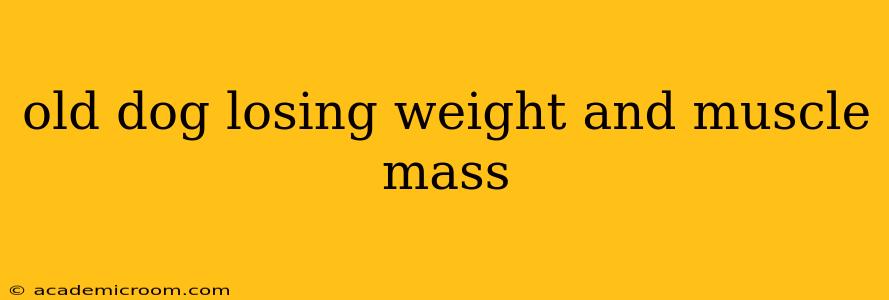Senior dogs, much like senior humans, experience changes in their bodies as they age. One common and concerning issue is weight loss and muscle mass decrease, often referred to as sarcopenia. This isn't just about aesthetics; it signals potential underlying health problems that require veterinary attention. This comprehensive guide explores the causes, diagnosis, and management of weight loss and muscle loss in older dogs.
Why is my old dog losing weight?
Weight loss in senior dogs isn't always straightforward. Several factors can contribute, and it's crucial to rule out serious medical conditions. Some common causes include:
- Dental Disease: Sore teeth or gum disease can make eating painful, leading to reduced food intake and subsequent weight loss. Older dogs are particularly prone to dental problems.
- Arthritis and Mobility Issues: Painful joints can make it difficult for dogs to move around, reducing their activity level and appetite. The decreased activity further contributes to muscle loss.
- Kidney Disease: Chronic kidney disease (CKD) is a prevalent condition in senior dogs and can cause a loss of appetite, nausea, and weight loss.
- Cancer: Various cancers can lead to weight loss due to decreased appetite, pain, and metabolic changes.
- Hyperthyroidism: An overactive thyroid gland can increase metabolism, leading to weight loss despite increased appetite. This is less common in dogs than in cats.
- Diabetes Mellitus: Untreated or poorly managed diabetes can result in significant weight loss.
- Inflammatory Bowel Disease (IBD): IBD can interfere with nutrient absorption, causing weight loss despite seemingly adequate food intake.
- Parasites: Internal parasites, even in older dogs, can contribute to weight loss by stealing nutrients. While less common in well-cared-for senior dogs, it’s still important to consider.
- Medication Side Effects: Certain medications can have weight loss as a side effect.
- Simple Age-Related Changes: As dogs age, their metabolism can slow down, and they may naturally require fewer calories. However, significant weight loss warrants veterinary examination.
What causes muscle loss in older dogs?
Muscle loss (sarcopenia) in senior dogs often accompanies weight loss and is a serious concern. It reduces their strength, mobility, and overall quality of life. Factors contributing to muscle loss include:
- Reduced Physical Activity: As dogs age, they become less active, leading to muscle atrophy.
- Poor Nutrition: A diet lacking in protein and essential nutrients can hinder muscle growth and maintenance.
- Underlying Medical Conditions: Many of the conditions listed above (kidney disease, cancer, etc.) can contribute to muscle loss.
- Hormonal Changes: Age-related hormonal changes can influence muscle mass.
How do I know if my old dog is losing muscle mass?
Identifying muscle loss can be challenging, but here are some signs to watch for:
- Prominent Ribs and Spine: You can more easily see the ribs and spine than usual.
- Loss of Body Condition: The dog appears thinner overall, with less muscle definition.
- Difficulty Getting Up or Walking: Weakness and reduced mobility are clear indicators.
- Decreased Strength: The dog struggles to perform tasks it once did easily, such as jumping on the sofa.
My old dog is losing weight and muscle – what should I do?
Immediate Veterinary Care is Essential: If your senior dog is experiencing significant weight loss and muscle loss, schedule an appointment with your veterinarian immediately. They will conduct a thorough physical exam, possibly including blood tests, urinalysis, and other diagnostic tests to identify the underlying cause.
What tests will the vet run to diagnose weight loss in my older dog?
Your vet will likely perform a range of tests depending on the initial assessment. This could include:
- Complete Blood Count (CBC): Checks for infections, anemia, and other blood abnormalities.
- Biochemistry Panel: Evaluates organ function, including kidneys, liver, and pancreas.
- Urinalysis: Analyzes urine for infections, kidney disease, and other problems.
- Thyroid Panel: Checks for hyperthyroidism.
- X-rays or Ultrasound: May be used to assess internal organs and bones.
- Fecal Exam: To rule out intestinal parasites.
- Dental Examination: To assess oral health.
How can I help my old dog gain weight and muscle?
Once the underlying cause of weight loss is identified and addressed by your veterinarian, you can work on supporting your dog's weight and muscle gain. This often involves a combination of:
- Dietary Adjustments: Your vet may recommend a high-protein, high-calorie diet tailored to your dog's specific needs and any medical conditions. This might involve prescription diets or commercially available senior dog foods.
- Nutritional Supplements: Supplements can help ensure your dog is getting all the essential nutrients for muscle growth and repair. Always consult your vet before giving your dog any supplements.
- Increased Caloric Intake: Small, frequent meals can be easier for your dog to manage than larger meals.
- Physical Therapy: Gentle exercise, tailored to your dog's capabilities, can help maintain muscle mass and improve mobility. Consult your vet before starting any exercise program.
- Pain Management: If arthritis or other pain is contributing to weight loss, pain management medication can improve appetite and activity levels.
Remember, early detection and prompt veterinary intervention are crucial for managing weight loss and muscle loss in senior dogs. By working closely with your veterinarian, you can improve your dog's health, comfort, and quality of life.
